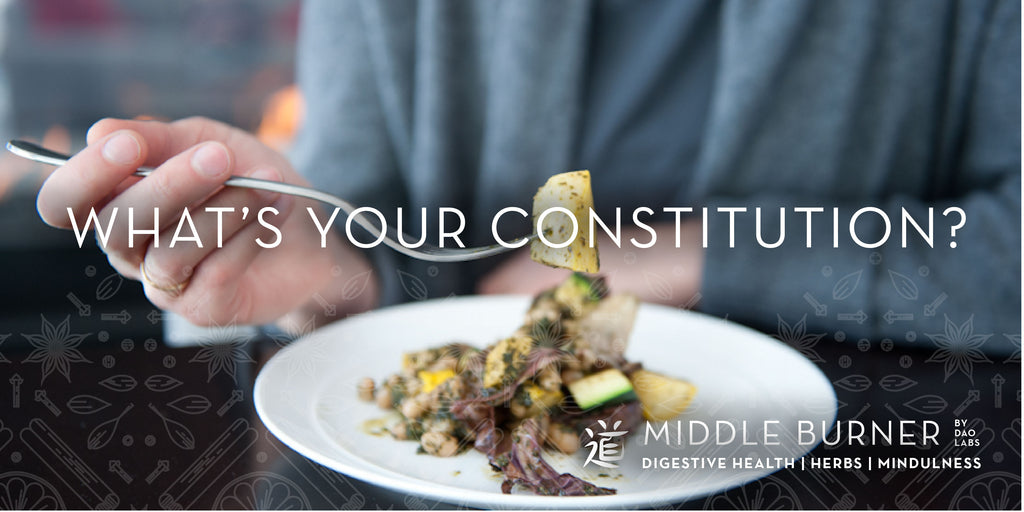As we embark upon the Middle Burner Diet by DAO Labs, we recognize that a key assumption is that all who follow this diet will be suffering from what doctors of Chinese medicine call “spleen vacuity with damp encumbrance”, which loosely translates to a diet that is too damp and cool (with a layer of the appropriate amount of stress). While that might ring true for most westerns, particularly in a time with overly processed foods and too much stimulation, it’s a departure from a key tenant in Chinese medicine and Chinese dietary therapy - everything should be tailored to the individual.
We recognize this, but also know that in order to advance the broader mission of raising awareness of the power of Chinese dietary therapy, we’ve selected to perfect an imbalance that is most common in our society. However, we do want to take a moment to recognize that eating to one’s constitution is key.
What is Eating to Your Constitution?
Eating to your constitution refers to the fact that every individual has a unique body type or constitution which changes over time. Your body’s constitution affects how you feel and behave and how your body responds to causes of illness. Imbalances in the body may lead to unwanted health conditions and ailments.
As one embarks on defining their constitution, it’s helpful to note at the forefront that Chinese medicine theory uses a handful of terms that, to the layperson, can be confusing, esoteric and as a consequence, intimidating and a barrier for many in pursuing this beautiful practice. To define many of the key terms within Chinese medicine extend far beyond the scope of this article (though we invite you to meet with an acupuncturist to learn more!) but for the purposes of lending context to this important dietary philosophy, we’ve synthesized some important terms below - let’s start with “constitution”:
Constitution: The personal characteristics that make us unique, simplistically formed by a combination of nature and nurture (or inherited and acquired influences). This is a very important concept within Chinese medicine, and should you visit an acupuncturist, something that they will use for their treatment diagnosis.
Qi: Very simplistically, Qi is “energy” in the very broadest, universal sense. It’s a central principle in Chinese medicine. It is continuously changing within your body.
Yin & Yang: Yin and Yang are central terms used to describe relative opposite qualities of Qi. Simplistically, if Yin is form, then Yang is function. Yin refers to aspects of Qi that are relatively material, substantial, condensing, solid, moist, dark and cooling. Yang refers to aspects that are relatively immaterial, expanding, hollow, light, hot, dry and warming.
Stagnation: Think of this like streams in nature, with water flowing naturally. If there is too little water, or the water becomes blocked with debris or pollution, the water will stagnate, fester and sit idle. The free and unfettered flow of blood, fluids and Qi within our body is thought to be similar - such situations lead to “stagnation”, which ultimately is not pleasant or healthy.
Dampness: Simplistically, dampness can be considered like having “high humidity” within the body - it can lead to a feeling of sluggishness, low energy and a feeling of heaviness.
Vacuity: Simplistically, think of vacuity as emptiness.
There are numerous other terms within both Chinese dietary therapy and Chinese medicine in general, all of which can get very confusing, very quickly. For us to appropriately boil these down would be way too complex, as our goal with this overview and our Middle Burner diet is to use the methodology as an introduction to a larger relationship with Chinese medicine - including working with an acupuncturist as part of your broader wellness routine. But a helpful knowledge of the most common imbalances, along with some of the key terms and concept of constitution will help you realize the power of food within Chinese medicine, along with an appreciation for longer-term benefits of the Middle Burner by DAO Labs.
















